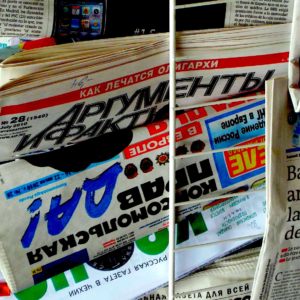 It was dark outside but warm—always warm and humid—when the truck dropped off the newspapers strung into bundles too heavy for me to lift. They thudded onto our front porch, divided into two or three stacks: the main section and the special sections to be tucked inside before we folded the paper into thirds and cinched each midsection with a rubber band. It was the Palm Beach Post; my uncle Chris wrote stories for the paper, but I didn’t know that then.
It was dark outside but warm—always warm and humid—when the truck dropped off the newspapers strung into bundles too heavy for me to lift. They thudded onto our front porch, divided into two or three stacks: the main section and the special sections to be tucked inside before we folded the paper into thirds and cinched each midsection with a rubber band. It was the Palm Beach Post; my uncle Chris wrote stories for the paper, but I didn’t know that then.
Ink and paper—every writer’s dance partners.
I was seven or eight, and outside of babysitting and helping around the house, delivering newspapers was my first job job, my first real job even though it wasn’t mine, technically. I was helping. It was me and my mom out there on the porch in the darkness. Or me and Melissa, my foster sister who was old enough to drive but who didn’t like to get up early. Mom says that sometimes my sister and brothers helped, but I mostly remember me and my mother bent over the papers, sleepy, wordless and purposeful. I was a good helper, which pleased her. And that pleased me.
Ink and paper. Opening the front door to see the day’s newspaper lying in wait has always seemed a wondrous feat. The news waiting. The paper delivered. I toddle out into the front yard in pajamas, stoop and retrieve. How satisfying the simple ritual. How I ache for it when I live abroad. Toddle, stoop, retrieve. A faint cloud of the smell of ink rises. I inhale vanilla, my grandmother’s closet, shoe boxes and damp leaves. And I am seven or eight again. I have come to hold sacred anything that makes me feel seven or eight again.
After folding dozens of papers and loading them into the back of the car, I was smudged with ink. Greasy, black smears, evidence, traces, words that had attached themselves to me in streaks. The dusky chemical smell encircled me, infused me. It moored into my neural channels. That smell carried texture and prophecy. Ten years later, I chose journalism as my college major. Ink and paper, all of my life has been lived there.
I had the paper route memorized and sat on the open tailgate of our station wagon, my legs dangling while we idled through the narrow streets of Palm Beach Shores, the fancy neighborhood on the other side of the South Florida island where I spent my childhood. Sandal Lane, Blossom Lane, Linda Lane, Inlet Way. Palm trees arched their fronds over the streets, coquina shells speckled the asphalt and hibiscus bushes formed low, shaggy hedges between the single-story houses.
It took us about an hour to finish the route, maybe more. This is child’s memory spelunked from long, long ago. Our last stop was made in the early daylight at the beachfront Colonnades Hotel where my mom used to model outfits from dress shops on Worth Avenue. I climbed stairs to an apartment over the bar and laid a newspaper at the front door of John D. MacArthur, the eccentric billionaire whose foundation supports NPR and sponsors the Genius Grant.
MacArthur was a high school dropout who made big money in insurance and real estate investment. He was Florida’s largest landowner during his lifetime and the country’s second richest man when he died in the ‘70s. All I ever saw of him was his front door. I brought him ink and paper.
I became a newspaper reporter after I graduated from college, working for the now-defunct Tampa Times, the sister paper to the now-defunct Tampa Tribune. We had morning deadlines because we were an afternoon paper.
One of my first beats was covering the courts. I headed to the downtown courthouse early in the mornings, scouring the halls for lawyers who might tip me off to something juicy. I skimmed documents, ducked into the courtrooms and did my best to scoop the Tribune. Jacked on deadline adrenaline, I wrote my stories longhand and dictated them over the lobby pay phone to my editor.
After lunch I made my way back to the newspaper. Before I dug in for the afternoon of phone calls and reporting, I often drifted down to the press room, where the newspapers were printed. The big presses were run by laconic, salty guys. I went to the press room to be alone and set myself right after the flurry of my morning.
The salty guys left me alone and went about their business. I sat in the corner of the room, fascinated by the presses. They sounded like locomotives as they thundered and spun. Ink and paper merging and somersaulting, making the newspapers that I had tossed onto front lawns. I was hypnotized. I was seven or eight. I was 23. I was the reader. I was the writer. Then I gathered myself into myself once again and walked upstairs to do the work I was meant to do.

